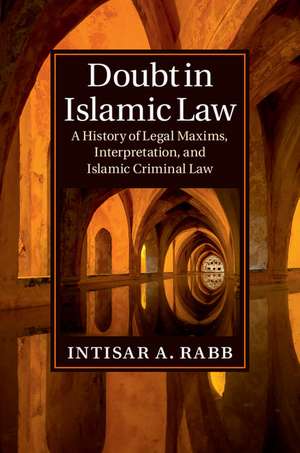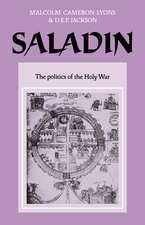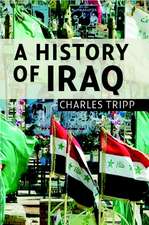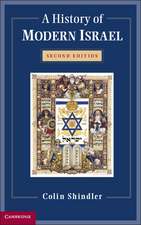Doubt in Islamic Law: A History of Legal Maxims, Interpretation, and Islamic Criminal Law: Cambridge Studies in Islamic Civilization
Autor Intisar A. Rabben Limba Engleză Hardback – 30 dec 2014
| Toate formatele și edițiile | Preț | Express |
|---|---|---|
| Paperback (1) | 277.54 lei 6-8 săpt. | |
| Cambridge University Press – noi 2017 | 277.54 lei 6-8 săpt. | |
| Hardback (1) | 759.99 lei 6-8 săpt. | |
| Cambridge University Press – 30 dec 2014 | 759.99 lei 6-8 săpt. |
Din seria Cambridge Studies in Islamic Civilization
-
 Preț: 199.99 lei
Preț: 199.99 lei - 14%
 Preț: 768.30 lei
Preț: 768.30 lei - 11%
 Preț: 695.06 lei
Preț: 695.06 lei -
 Preț: 233.11 lei
Preț: 233.11 lei - 19%
 Preț: 566.82 lei
Preț: 566.82 lei -
 Preț: 230.14 lei
Preț: 230.14 lei -
 Preț: 289.39 lei
Preț: 289.39 lei - 9%
 Preț: 591.82 lei
Preț: 591.82 lei -
 Preț: 281.30 lei
Preț: 281.30 lei -
 Preț: 185.26 lei
Preț: 185.26 lei - 14%
 Preț: 675.82 lei
Preț: 675.82 lei -
 Preț: 243.53 lei
Preț: 243.53 lei - 14%
 Preț: 680.53 lei
Preț: 680.53 lei -
 Preț: 295.58 lei
Preț: 295.58 lei -
 Preț: 328.80 lei
Preț: 328.80 lei -
 Preț: 417.25 lei
Preț: 417.25 lei - 11%
 Preț: 693.02 lei
Preț: 693.02 lei -
 Preț: 408.37 lei
Preț: 408.37 lei -
 Preț: 284.17 lei
Preț: 284.17 lei - 14%
 Preț: 770.83 lei
Preț: 770.83 lei -
 Preț: 335.34 lei
Preț: 335.34 lei -
 Preț: 326.94 lei
Preț: 326.94 lei -
 Preț: 286.51 lei
Preț: 286.51 lei - 14%
 Preț: 677.47 lei
Preț: 677.47 lei -
 Preț: 208.30 lei
Preț: 208.30 lei - 11%
 Preț: 641.31 lei
Preț: 641.31 lei - 11%
 Preț: 604.41 lei
Preț: 604.41 lei - 11%
 Preț: 690.27 lei
Preț: 690.27 lei -
 Preț: 371.83 lei
Preț: 371.83 lei -
 Preț: 324.53 lei
Preț: 324.53 lei - 11%
 Preț: 698.50 lei
Preț: 698.50 lei -
 Preț: 375.30 lei
Preț: 375.30 lei - 11%
 Preț: 693.36 lei
Preț: 693.36 lei -
 Preț: 207.74 lei
Preț: 207.74 lei -
 Preț: 362.17 lei
Preț: 362.17 lei - 11%
 Preț: 694.38 lei
Preț: 694.38 lei - 11%
 Preț: 690.46 lei
Preț: 690.46 lei - 11%
 Preț: 691.66 lei
Preț: 691.66 lei - 11%
 Preț: 694.23 lei
Preț: 694.23 lei -
 Preț: 389.50 lei
Preț: 389.50 lei -
 Preț: 370.46 lei
Preț: 370.46 lei -
 Preț: 422.96 lei
Preț: 422.96 lei
Preț: 759.99 lei
Preț vechi: 883.71 lei
-14% Nou
Puncte Express: 1140
Preț estimativ în valută:
145.42€ • 152.24$ • 120.33£
145.42€ • 152.24$ • 120.33£
Carte tipărită la comandă
Livrare economică 05-19 aprilie
Preluare comenzi: 021 569.72.76
Specificații
ISBN-13: 9781107080997
ISBN-10: 1107080991
Pagini: 432
Ilustrații: 2 tables
Dimensiuni: 155 x 229 x 30 mm
Greutate: 0.75 kg
Editura: Cambridge University Press
Colecția Cambridge University Press
Seria Cambridge Studies in Islamic Civilization
Locul publicării:New York, United States
ISBN-10: 1107080991
Pagini: 432
Ilustrații: 2 tables
Dimensiuni: 155 x 229 x 30 mm
Greutate: 0.75 kg
Editura: Cambridge University Press
Colecția Cambridge University Press
Seria Cambridge Studies in Islamic Civilization
Locul publicării:New York, United States
Cuprins
Introduction; Part I. Institutional Structures and Doubt, Seventh–Sixteenth Century CE: 1. The God of severity and lenity; 2. The rise of doubt; Part II. Morality and Social Context, Eighth–Eleventh Century CE: 3. Hierarchy and hudud laws, eighth–ninth century CE; 4. Doubt as moral discomfort, tenth–eleventh century CE; Part III. The Jurisprudence of Doubt, Eighth–Sixteenth Century CE: 5. Doubt as an element of Islamic criminal law, eighth–eleventh century CE; 6. Substantive, procedural, and interpretive doubt, eleventh–sixteenth century CE; 7. Strict textualism as a limitation on doubt: Sunni opponents, eighth–eleventh century CE; 8. Dueling theories of delegation and interpretation: Shi'i doubt, tenth–sixteenth century CE; Conclusion: doubt in comparative and contemporary context.
Recenzii
'In her extremely detailed book, Intisar A. Rabb traces the formation of the legal maxim of doubt in Islamic criminal law from the seventh until the eleventh century (CE) within both the Sunni and Shi'i legal traditions … Rabb's book offers an important contribution to the study of Islamic law. She has shown how the Muslim legal elite, even the eponymous Sunni jurists and their immediate successors, were individual human agents with a pragmatic bent, and as such their juridical thinking was shaped by complex and diverse goals such that they never arrived at a uniform definition of doubt. Neither did they limit themselves to a specific canon of 'texts' in order to develop an increasingly sophisticated jurisprudence of doubt by the eleventh century.' Nurfadzilah Yahaya, Society for Contemporary Thought and the Islamicate World Review
'Even for aficionados of progressive legal interpretation who only dabble in Islamic legal theory, among whom this reviewer is most certainly included, the 'closing of the gates of ijtihād' is a concept that is known and, for the most part, feared - but Rabb puts a new spin on that understanding.' M. Christian Green, Journal of Law and Religion
'Even for aficionados of progressive legal interpretation who only dabble in Islamic legal theory, among whom this reviewer is most certainly included, the 'closing of the gates of ijtihād' is a concept that is known and, for the most part, feared - but Rabb puts a new spin on that understanding.' M. Christian Green, Journal of Law and Religion
Notă biografică
Descriere
This book considers the rarely studied but pervasive concepts of doubt that medieval Muslim jurists used to resolve problematic criminal cases.














